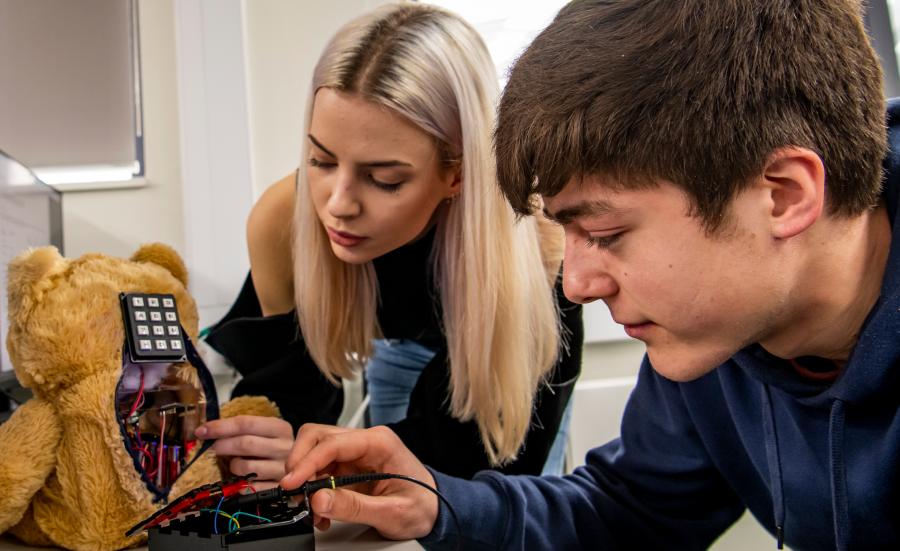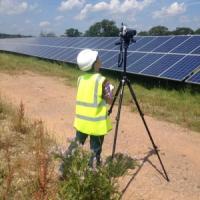About this course
Develop your electronic engineering knowledge on this master’s degree at the University of Southampton. This MSc course will give you the latest techniques, technologies and tools to help you meet emerging economic and social challenges. We’re a top 10 university in the UK for electronic engineering, meaning you’ll get the graduate opportunities you need for your future career.
The MSc Electronic Engineering is a portfolio master’s degree, enabling you to further your knowledge of a number of areas, such as:
- micro and nanoelectronics
- optoelectronics
- micro and nanotechnology
- wireless communications
It offers a wider choice of modules than our specialist masters programmes, enabling you to tailor the degree to your interests. You’ll also work during the summer research project on a specialist topic.
The degree is accredited by the Institution of Engineering and Technology (IET) on behalf of the Engineering Council as meeting the requirements for Further Learning for registration as a Chartered Engineer.
Candidates must hold a CEng accredited BEng/BSc (Hons) undergraduate first degree to comply with full CEng registration requirements.
Course lead
The course lead is Dr Maurits De Planque. As Associate Professor at the Life Sciences Interface of ECS his main research interests are nano/microtechnology aspects of bioengineering, including chemical oscillators, microfluidic cell arrays, semiconductor biosensors and ion channel nanopores. Find out more on Dr De Planque’s staff profile page.
Accreditations
Course location
This course is based at Highfield.
Awarding body
This qualification is awarded by the University of Southampton.
Download the Course Description Document
The Course Description Document details your course overview, your course structure and how your course is taught and assessed.
Changes due to COVID-19
Although the COVID-19 situation is improving, any future restrictions could mean we might have to change the way parts of our teaching and learning take place in 2021 to 2022. We're working hard to plan for a number of possible scenarios. This means that some of the information on this course page may be subject to change.
Find out more on our COVID advice page.
Entry requirements
You’ll need a 2:1 degree in electronic engineering or a closely related subject.
You must also have an upper 2:1 score in the following:
- 1 maths module
- 5 electronics modules (e.g. semiconductor devices, microelectronics, microprocessors, digital systems, control and communications, signal processing, signals and systems, automation)
Find the equivalent international qualifications for your country.
English language requirements
If English isn't your first language, you'll need to complete an International English Language Testing System (IELTS) to demonstrate your competence in English. You'll need all of the following scores as a minimum:
IELTS score requirements
- overall score
- 6.5
- reading
- 6.0
- writing
- 6.0
- speaking
- 6.0
- listening
- 6.0
We accept other English language tests. Find out which English language tests we accept.
Got a question?
Please contact us if you're not sure you have the right experience or qualifications to get onto this course.
Email: enquiries@southampton.ac.uk
Tel: +44(0)23 8059 5000
Course structure
This electronic engineering master’s consists of 8 taught modules, and an individual research project. You can choose 7 modules from a wide range of topics, allowing you to personalise your course to suit your own interests.
By choosing appropriate modules, it is possible to concentrate on a specific topic:
- micro/nanoelectronics
- micro/nanotechnology
- communications
- optoelectronics
You’ll need to study a research and project preparation, module which spans the entire course. You’ll prepare for your research project and examine ethical and legal issues around professional practice.
Over the summer you’ll write up your research project.
We recommend you read up on MATLAB for our wireless communications and signal processing modules.
Want more detail? See all the modules in the course.
Modules
Changes due to COVID-19
Although the COVID-19 situation is improving, any future restrictions could mean we might have to change the way parts of our teaching and learning take place in 2021 to 2022. We're working hard to plan for a number of possible scenarios. This means that some of the information on this course page may be subject to change.
Find out more on our COVID advice page.
For entry in Academic Year 2022-23
Year 1 modules
You must study the following modules:
Your research project will enable you to explore in depth some aspect of your specialist subject area. You will be allocated a project supervisor with whom you will meet and agree a project brief and plan. These must be submitted to, and agreed by, ...
The Module will prepare students for the summer Research Project and research based coursework exercises. It will give students a grounding in the research methods and techniques necessary in order for planning and successful execution and completion of t...
You must also choose from the following modules:
This module aims to introduce to the students advanced model based signal processing methods and systems design theories, with illustrative case studies to demonstrate how the knowledge obtained in this module can be used in some challenging real life app...
The key aim of this module is to provide the background and the methods for the understanding of the operation of basic analogue CMOS cells, and how to design common functions. The emphasis is placed on design of analogue functions specifically as part of...
The aim of this module is to provide an overview of a range of biomolecular, microscale and nanoscale systems and devices, including sensors. The module consists of practical work on three different systems, involving construction and characterisation wit...
- To expand knowledge of techniques for information transmission via discrete (digital) channels, which have a wide area of applications, i.e. distributed computer systems, instrumentation and control systems, as well as communication systems of all types...
The following topics will be covered: - How SystemVerilog is interpreted for simulation and synthesis - How to use EDA tools to configure FPGAs - The principles of functional verification of digital systems - The principles of Built-In Self-Test and s...
Describe the design of complex digital systems using a (SystemVerilog and SystemC based) behavioural synthesis approach. Provide understanding of the algorithms which underpin behavioural synthesis including scheduling, allocation and binding. Gain ...
This module gives a broad introduction to application-specific processor system design and illustrates the use of such processors in the broader context of complex digital systems. A significant portion of the module assessment is coursework where stud...
This module describes in detail recent development in electronic devices that reduce energy consumption, generate power, or advance the distribution of power. Together these set of devices will play an essential role in the reduced dependence on fossil fu...
This module provides an overview of modern microfabrication technologies for the making of micro structures applicable to device engineering. The various fabrication techniques that are relevant for microdevices in the field of electronics, optoelectroni...
This module teaches the basics of the behaviour of fluids in microsystems, specifically focussing on the interaction of fundamental physical mechanisms and the design of microfluidic devices. It also reviews and analyses the state of the art in applied mi...
This module presents a broad overview of microsensor technologies, including the basic principles of measurement systems and the scaling effects arising from system miniaturisation. The practical component, assessed by a Lab Report, involves the design an...
The module will discuss all important issues related to scaling down the transistor size into the nanometer regime, such as high-k dielectrics and FINFETs. The teaching will be complemented with a finite element simulation of the MOS scaling which will br...
This course consists of two parts: 'Nanofabrication' deals with the fabrication of structures that are smaller than 100 nm, while 'Microscopy' concerns the visualisation of such small features. Advanced optical lithography concepts are illustrated by a co...
Optical fibre sensor technology is playing an increasing role in modern-day life with a range of applications emerging in areas spanning civil engineering, defence and the life sciences. This module focuses on a key area of ORC expertise that has develope...
In-depth knowledge of optical fibres as a light guiding medium is vital for understanding most other areas of optical fibre technology (telecommunications, sensors), and as support for practical work in this field. This module will describe the core areas...
The aim of this module is to provide an overview of advancement of quantum devices and technology in line with the development of nanoelectronics and nanotechnology. Students will gain knowledge of basic quantum mechanics and how the quantum mechanics are...
This course covers security and trust of hardware and embedded devices, with a particular focus on the emerging security challenges facing the internet of things technology. It includes the following topics: vulnerabilities in current digital system desig...
This module aims to introduce to the students signal processing techniques, including analogue and digital filter design and systems design theories. The module also introduces the concepts of statistical signal processing including estimation and detecti...
The course will present an introduction to guided waves, optical modes, and propagation characteristics of photonic circuits, using Silicon Technology by way of example.
This course introduces the principles and techniques needed to design a wireless transceiver. We will cover the process needed to take the main principles of digital communications such as digital modulation and detection. Through lectures and coursework,...
The module consists of the following 8 components: 1. Introduction; 2. Data link layer; 3. Medium access control sublayer; 4. Network layer; 5. Queueing theory and queueing models; 6. Cellular wireless networks; 7. Wireless local area networ...
Learning and assessment
Learning
The learning activities for this master’s in electronic engineering include the following:
- lectures
- classes and tutorials
- lab work
- individual and group projects
- independent learning (studying on your own)
Assessment
We’ll assess you through:
- lab reports and essays
- individual and group projects
- problem-solving exercises
- written exams
- a research report
Academic Support
You’ll have access to a personal tutor and a mentor, whom you can meet for advice on your programme and choice of options, or for pastoral support.
The ECS Student Advisory Team and helpdesk are also available to give you support and advice.
Careers
This programme provides an excellent platform for a career in academic studies or industry sectors such as:
- electronics and semiconductors
- telecommunications
- photonics
- materials and packaging
- biotechnology
- motor vehicle and aerospace industries
We are ranked second equal for graduate prospects in Electrical and Electronic Engineering in the Complete University Guide 2019.
Graduates from our MSc programmes are employed worldwide in leading companies at the forefront of technology. As well as for larger multinationals, many students also go on to work for small to medium enterprises, including start-ups.
ECS runs a dedicated careers hub which is affiliated with over 100 companies including:
- IBM
- Arm
- Microsoft Research
- Imagination Technologies
Careers services at Southampton
We're a top 20 UK university for employability (QS Graduate Employability Rankings 2020). Our Careers and Employability Service will support you throughout your time as a student and for up to 5 years after graduation. This support includes:
- work experience schemes
- CV/resume and interview skills workshops
- networking events
- careers fairs attended by top employers
- a wealth of volunteering opportunities
- study abroad and summer school opportunities
We have a thriving entrepreneurship culture. You'll be able to take advantage of:
- our dedicated start-up incubator, Futureworlds
- a wide variety of enterprise events run throughout the year
- our partnership in the world’s number 1 business incubator, SETsquared
Fees, costs and funding
Tuition fees
Fees for a year's study:
- UK students pay £9,250.
- EU and international students pay £28,000.
What your fees pay for
Your tuition fee covers the full cost of tuition and any exams.
Find out how to pay your tuition fees.
Accommodation and living costs, such as travel and food, are not included in your tuition fees. Explore:
10% alumni discount
If you’re a graduate of the University of Southampton you get a 10% discount on your postgraduate tuition fees.
Postgraduate Master’s Loans (UK nationals only)
This can help with course fees and living costs while you study a postgraduate master's course. Find out if you're eligible.
Funding your postgraduate studies
A variety of additional scholarships, grants and bursaries may be available to help you fund your master’s study, both from the University and from other organisations.
Funding for EU and international students
Find out about funding you could get as an international student.
How to apply
- Use the 'apply for this course' button on this page to take you to our online application form.
- Search for the course you want to apply for.
- Complete the application form and upload any supporting documents.
- Submit your application.
Application deadlines
UK students
Make sure we receive your application at least 4 weeks before the start of the course. This gives us time to consider your application, if there are still places available.
International students
Make sure we receive your application at least 6 weeks before the start of the course.
This gives us time to consider your application, if there are still places available. It will also give you time to apply for a visa if we offer you a place.
Application assessment fee
We’ll ask you to pay a £50 application assessment fee if you’re applying for any postgraduate taught course that starts in or after September 2021.
This is an extra one-off charge which is separate to your tuition fees. It covers the work and time it takes us to assess your application. You’ll be prompted to pay when you submit your application which won’t progress until you've paid.
If you're a current or former University of Southampton student, if you're applying for a Master of Research (MRes) degree, or if you're applying for a PGCE course via UCAS, you will not need to pay the fee. Find out if you’re exempt on our terms and conditions page.
Supporting information
When you apply you’ll need to submit a personal statement explaining why you want to take the course.
You’ll need to include information about:
- your knowledge of the subject area
- why you want to study a postgraduate qualification in this course
- how you intend to use your qualification
You'll also need to send 2 academic references.
Please include the required paperwork showing your first degree and your IELTS English language test score (if you are a non-native English speaker) with your application. Without these, your application may be delayed.
Learn more about how to apply with our postgraduate application guide.
What happens after you apply
You'll be able to track your application through our online Applicant Record System.
We'll assess your application on the strength of your:
- academic achievements
- relevant professional experience
- personal statement
- academic references
We'll aim to get back to you within 6 weeks with a decision about your application.
Equality and diversity
We treat and select everyone in line with our Equality and Diversity Statement.
Got a question?
Please contact us if you're not sure you have the right experience or qualifications to get onto this course.
Email: enquiries@southampton.ac.uk
Tel: +44(0)23 8059 5000
Related courses
- Courses
-
Student life
- Accommodation
- Our campuses
- Our cities
- Student community
- Sports and gyms
- Support and money
- Halls Filter
- Research
- Business
- Global
- Open days and visits
- Clearing
- Schools and colleges
- About
- Visit
- Alumni
- Departments
- News
- Events
- Contact




